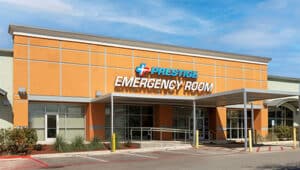Allergic Reaction Treatment in the Emergency Room
Understanding the difference between allergies and a severe allergic reaction is vital in deciding whether to go to urgent care or the ER for evaluation and treatment. It could be the difference between life and death.
Many of us suffer from seasonal allergies, in which pollen or molds trigger sneezing and congestion. In San Antonio, mountain cedar pollen can be severe, afflicting many with “cedar fever.”
You may be allergic to pet dander or dust. You may develop a rash from a new detergent. For some people, an allergen can trigger a dangerous allergic reaction that calls for emergency medical care.
Exposure to allergens like latex, shellfish, nuts, peanuts, insect stings, and certain medications can trigger a severe allergic reaction in certain people. Also known as anaphylaxis or anaphylactic shock, this kind of reaction comes on quickly and can be deadly. In a severe allergic reaction, ER care is essential. We can provide rapid and comprehensive care for emergency allergic reactions at Prestige ER.
When to Go to the ER for an Allergic Reaction
If you or a family member is having an anaphylactic reaction–indicated by symptoms like neck or facial swelling, difficulty breathing, nausea, or rapid heart rate–you must call 9-1-1 now!
Call for an ambulance–do not attempt to drive to the ER. If you have an epinephrine injector (Epi Pen), use it immediately, then get to an ER for necessary follow-up medical care.
Even if you feel better after an epinephrine injection, symptoms may recur, and you need to be in the care of medical professionals who can monitor your recovery and help if needed.
The effects of an allergic reaction can unfold rapidly, and an ambulance should transport you. Paramedics on board the ambulance can provide the emergency medical care you may need before reaching the ER. They can administer medications, manage your airway, administer oxygen, and perform CPR if needed while transporting you to an emergency room for allergic reaction treatment.
Symptoms of an Allergic Reaction
- Rash.
- Hives (a swollen, bumpy rash).
- Itching.
Symptoms of a Severe Allergic Reaction
- Difficulty breathing.
- Rapid breathing.
- Swelling of the face, mouth, neck, or throat.
- Dizziness or fainting.
- Nausea, vomiting, or diarrhea.
In an anaphylactic reaction, exposure to an allergen—such as an insect sting, peanuts, medications, or certain foods—releases a flood of chemicals in your body, including histamine. In response, your blood pressure drops, your airways may swell, your heart rate may increase, and you may feel nauseous and vomit. Many people experience an unsettled sensation that is often described as a feeling of impending doom.
The symptoms of anaphylactic shock typically occur within minutes of exposure to an allergen. Sometimes, the reaction may be delayed for up to an hour or longer.
Prompt treatment of unfolding allergic reactions is essential in stopping the effects of anaphylactic shock, which can be fatal. Because anaphylaxis is a medical emergency and may require advanced levels of care, it is essential to go to an ER rather than an urgent care.
What Will the ER Do for an Allergic Reaction?
Our highly trained team at Prestige ER will quickly evaluate and stabilize you for allergic reactions. Our providers will ensure you receive appropriate medications, including epinephrine (adrenaline). Other medications you may be given include oxygen, inhaled medications like albuterol, and intravenous antihistamines and steroids.
Your provider will discuss your medical history, including any previous allergies or reactions. You may have blood work and other diagnostic testing ordered to diagnose and treat your allergic reaction and rule out other conditions.
Prestige ER offers a full spectrum of on-site diagnostic services, including X-rays, CT scans, ultrasound, and lab work.
Our caring and experienced emergency room staff will strive to keep you comfortable and informed while providing prompt, excellent allergic reaction treatment. We will ensure you go home safely with the medications, resources, and knowledge you need to manage your allergies.
We will transfer you there directly if you need hospital admission for more extensive care or procedures.
Managing Your Allergies
Carry Your Medication
If you have had a severe allergic reaction, you may have been prescribed an epinephrine autoinjector (Epi Pen). It is essential that you always keep it with you and replace the medication before its expiration date. Be sure you know how to use the autoinjector–it can save your life.
Avoid Triggers
Ensure you are tested to identify the specific allergens that trigger a reaction. Avoid exposure to these allergens.
If the allergen is a food product (such as peanuts, wheat, or nuts), check ingredient labels carefully and avoid foods containing these ingredients. Make sure family members and friends who may be preparing food are aware of your allergies.
Documenting any medication or latex allergies in your medical record and informing medical providers at any appointment or hospital visit is essential. If your child has experienced anaphylaxis, ensure their teachers and the school nurse are aware of their allergy. Vigilance and caution are crucial when it comes to anaphylaxis.
We invite you to choose Prestige ER, a trusted choice for prompt, expert emergency care in San Antonio. If you or a loved one needs allergic reaction treatment, emergency room providers at Prestige ER can help.
We treat a full spectrum of medical emergencies and offer the same services as a hospital-based emergency room but with shorter wait times. Find a location near you or contact us with any questions.












